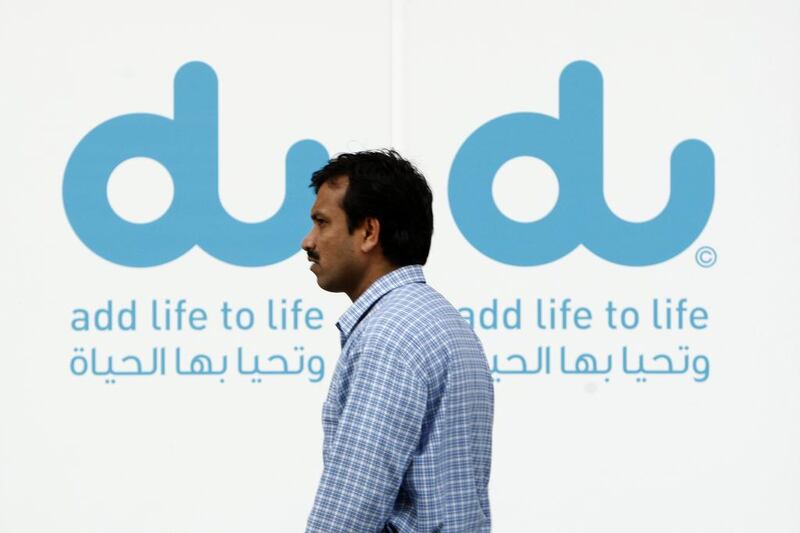Du, the UAE's second-biggest telecoms operator, reported a 1.3 per cent increase in second-quarter net profit on Thursday, as fixed-line revenues rose.
The Dubai-based operator made a net profit after royalty of Dh453 million in the three months to June, slightly up from Dh447m in the same period last year, it said in a statement on Thursday. EFG-Hermes forecast it would earn a quarterly profit of Dh429m. Total revenues grew 2.9 per cent to Dh3.35 billion but mobile revenues slid 1.6 per cent to Dh1.82bn while fixed-line revenue jumped 9.4 per cent to Dh583m.
"Top-line growth was supported by a solid performance in our fixed line business," Osman Sultan, Du's chief executive, said in the statement. "Mobile revenues, although impacted by seasonality with Ramadan and Eid being observed in the second quarter of the year, were stable."
_______________
Read more:
UAE mobile networks pay tribute to Saudi-Emirati Co-ordination Council
Dubai Expo 2020 5G takes digital into a new era
_______________
Omar Maher, head of telecom sector research at EFG Hermes said the second-quarter figures were more or less what was expected, with no major surprises "except maybe Ebitda margin, which came in a bit stronger, as we expected the margin to be softer due to the seasonality impact of Ramadan".
"I believe it is normal to see muted net profit growth considering: it is a mature market, growth is naturally slow; the UAE economy is slowing down; and competition is toughening up," he added.
He said for the full year, the main growth driver will remain data and ICT,and, from a macro perspective, the Expo 2020.
"Increasing visitors could help improve consumption a bit. In the longer run, the digitisation of the economy and increasing adoption of data across various applications will help ensure stable growth for telecom operators," Mr Maher said.
He said 2018 was likely to be a bit of an "uninspiring" year; the economy is slowing down and "we’re seeing evidence in other sectors, eg real estate, and this will affect the telecom sector and Du sooner or later".
But in the longer run, beyond 2018, he said the fundamentals of the UAE telecom sector remain the healthiest in GCC/Mena and said his firm's 2018 net profit estimate for Du is Du1.8bn.
Regarding Du's restructuring programme, he said it was too early to see the benefits yet.
"This is a longer-term exercise that will take time and investments before we actually start seeing its impact on the numbers." Mr Maher said.
The company said in May it would roll out this year a limited service of 5G, the ultra-high speed mobile broadband that is set to revolutionise the internet, ahead of a wider launch next year. The announcement followed the UAE's largest telecoms firm Etisalat's plans to roll out 5G commercial fixed devices and services this coming September.
Du said its board of directors proposed a dividend payment of 13 fils per share, subject to shareholder approval at its general meeting.
"Our company had a strong second quarter and a solid first half of the year in 2018, with growth across all our key indicators," said Mohamed Al Hussaini, chairman of Du. "Despite a maturing telecom market, we are pleased to deliver excellent growth in revenue and net profit."
Du paid Dh527.5m in government royalty tax in the second quarter, according to a statement on the Dubai Financial Market.
The firm's active mobile subscribers declined almost 4 per cent in the second quarter and is not expected to recover in the second half of 2018, Mr Sultan said. The company disconnected some mobile customers at an accelerated rate on the back of the UAE regulator's "My Number, My Identity" campaign.
"I do not see this reversing," he said. "A lot of action is taken to stimulate usage but when it comes to pre-paid, and we have a bigger proportion of subscribers that are pre-paid, I do not foresee a reversal."
Only 15 to 20 per cent of Du's mobile customer base is in the post-paid segment.
However, the average revenue per subscriber continues to grow, he said, without providing figures.






